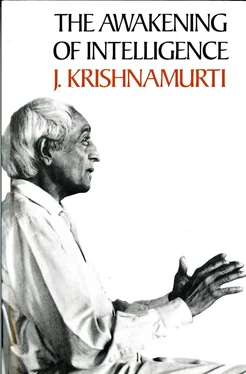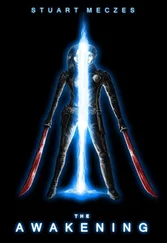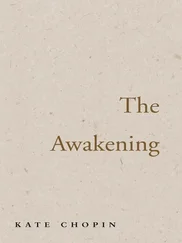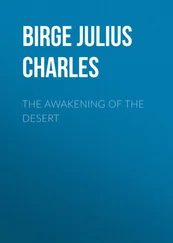Naudé: Would you please explain what this change in consciousness consists of?
KRISHNAMURTI: That’s what we are going to talk about now.
Naudé: And then perhaps we can ask about the divine if it arises.
KRISHNAMURTI: ( Pause ) First of all, is there any possibility of a change in consciousness? Or is any change made consciously no change at all? To talk about a change in consciousness implies changing from this to that.
Naudé: And both this and that are within consciousness.
KRISHNAMURTI: That is what I want to establish first. That when we say there must be a change in consciousness, it is still within the field of consciousness.
Naudé: The way we see the trouble, and the way we see the solution, which we call change—that is all within the same area.
KRISHNAMURTI: All within the same area and therefore no change at all. That is, the content of consciousness is consciousness and the two are not separate. Let’s be clear on that point too. Consciousness is made up of all the things that have been collected by man as experience, as knowledge, as misery, confusion, destruction, violence—all that is consciousness.
Naudé: Plus so-called solutions.
KRISHNAMURTH: God, no-God, various theories about God, all that is consciousness. When we talk about change in consciousness we are still changing the pieces from one corner to the other.
Naudé: Yes.
KRISHNAMURTI: Moving one quality into another corner of the field.
Naudé: Juggling with the contents of this huge box.
KRISHNAMURTI: Yes, juggling with the contents. And therefore . . .
Naudé: We are changing variables in the same set of things.
KRISHNAMURTI: That’s right. You have put it perfectly, better than I have. When we talk about changing, we are really thinking of juggling with the contents—right? Now that implies a juggler and the thing with which he is juggling. But it is still within the field of consciousness.
Naudé: There are two questions which arise. Are you saying that there is no consciousness at all outside of the content of consciousness? And secondly, that there is no entity at all to juggle, there is no entity called ‘me’ outside of this content of consciousness?
KRISHNAMURTI: Obviously not.
Naudé: These are two big statements, Sir. Would you be kind enough to explain them?
KRISHNAMURTI: What is the first question?
Naudé: The first thing you are saying, if I have understood correctly, is: that this consciousness which we are discussing, which is all we are and all we have, and which we have seen is the problem itself, you are saying that this consciousness is its very content, and that there is nothing to be called consciousness outside of the content of consciousness?
KRISHNAMURTI: Absolutely right.
Naudé: Are you saying, outside of man’s problems, outside of his misery, outside of his thinking, outside of the formulations of his mind, there is nothing at all we call consciousness?
KRISHNAMURTI: Absolutely right.
Naudé: This is a big statement. Would you explain this? We all think—and this has been postulated by Indian religions since the beginning of time—that there is a super-consciousness outside of this shell which is the consciousness we are talking about.
KRISHNAMURTI: To find out if there is something beyond this consciousness, I must understand the content of this consciousness. The mind must go beyond itself. Then I shall find out if there is something other than this or not. But to stipulate that there is has no meaning, it is just a speculation.
Naudé: So are you saying that what we commonly call consciousness, and what we are talking about, is the very content of this consciousness? The container and contained are an indivisible thing?
KRISHNAMURTI: That’s right.
Naudé: And the second point you are making is: that there is no entity to decide, to will, and to juggle, when the contents to be juggled are absent.
KRISHNAMURTI: That is, my consciousness is the consciousness of the world, and the consciousness of the world is me. This is a truth, not just my invention or dependent on your acceptance. It is an absolute truth. Also the content is consciousness: without the content there is no consciousness. Now when we want to change the content we are juggling.
Naudé: The content is juggling itself, because you have a third point, that there is nobody outside of this content to do any juggling at all.
KRISHNAMURTI: Quite right.
Naudé: So the juggler and the content are one, and the container and the content are one.
KRISHNAMURTI: The thinker who within this consciousness says that he must change, is consciousness trying to change. I think that is fairly clear.
Naudé: So that the world, the consciousness and the entity who supposedly will change it, are all the same entity, masquerading, as it were in three different roles.
KRISHNAMURTI: If that is so, then what is a human being to do to bring about a total emptying of the content of consciousness? How is this particular consciousness, which is me and the world with all its miseries, how is that to undergo complete change? How is the mind—which is consciousness, with all its content, with the accumulated knowledge of the past—how is that mind to empty itself of all its content?
Naudé: But people will say, hearing what you have said, understanding it imperfectly, they will say: can that consciousness be emptied, and when that consciousness is emptied, supposing this were possible, doesn’t that reduce one to a state of considerable vagueness and inertia?
KRISHNAMURTI: On the contrary. To have come to this point requires a great deal of enquiry, a great deal of reason, logic, and with it comes intelligence.
Naudé: Because some people may think that the empty consciousness, which you speak about, is something like the consciousness of the child at birth.
KRISHNAMURTI: No, Sir, not at all. Let’s go slowly at this, step by step. Let’s begin again. My consciousness is the consciousness of the world. The world is me and the content of my consciousness is the content of the world. The content of consciousness is consciousness itself.
Naudé: And also that is the entity who says he is conscious.
KRISHNAMURTI: Now I am asking myself, realising I am that, what is then changed?
Naudé: What is changed which will solve these three sets of problems that are really one?
KRISHNAMURTI: What is implied by change? What is implied by revolution?—not physical revolution.
Naudé: We have gone beyond that.
KRISHNAMURTI: Physical revolution is the most absurd, primitive, unintelligent destruction.
Naudé: It is fragmentation in this consciousness.
KRISHNAMURTI: Yes.
Naudé: Are you asking what it is which will restore order to this consciousness?—an order which is whole.
KRISHNAMURTI: Can there be order within this consciousness?
Naudé: Is that the next step?
KRISHNAMURTI: That is what you are asking.
Naudé: Yes. Since we see that the disorder, which is the sorrow and the suffering, is the disorder in this indivisible consciousness, the next question must be: what are we going to do about it?
KRISHNAMURTI: Yes.
Naudé: And since there is no entity who can do something about it . . .
KRISHNAMURTI: Wait, don’t jump to that immediately.
Naudé: Because we have seen that the disorder is the entity.
KRISHNAMURTI: Do we realise that? No. Do we realise that the thinker is part of this consciousness and is not a separate entity outside this consciousness? Do we realise that the observer, seeing the content, examining, analysing, looking at it all, is the content itself? That the observer is the content?
Читать дальше












